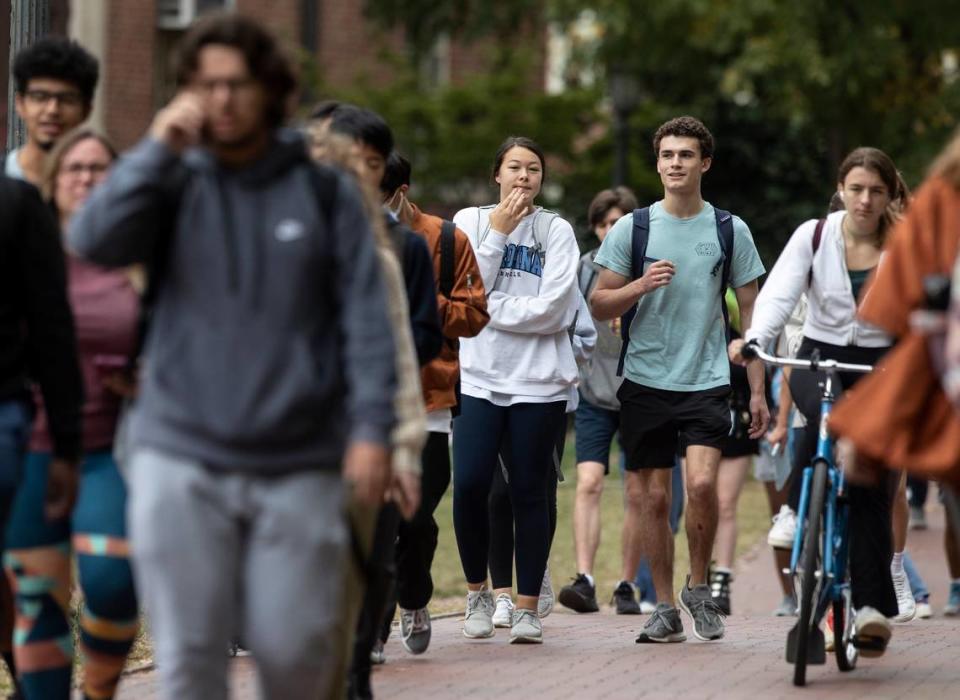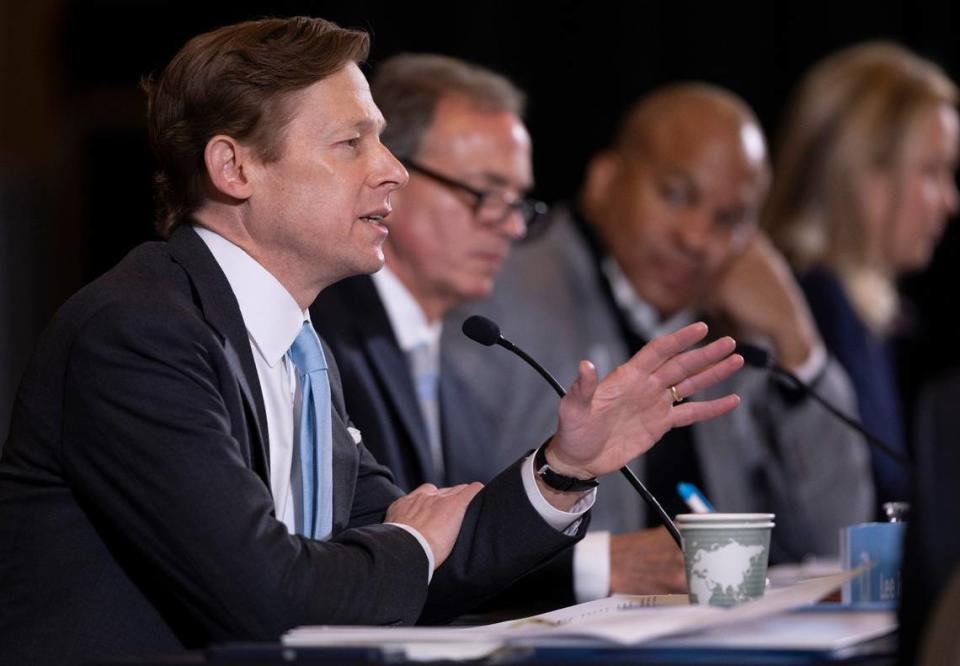UNC System’s looming DEI vote could end jobs and spending. Records hint at which ones
Even as the UNC System Board of Governors appears poised to join a growing national trend and repeal mandates for diversity, equity and inclusion efforts across North Carolina’s public universities, public details about the exact implications of the move remain sparse.
But there are some clues about the policy’s potential impacts.
The board, which dictates policy for all 16 public universities in the state and the North Carolina School of Science and Mathematics, is expected to vote May 23 on a proposed policy that would eliminate existing DEI requirements, including a mandate that each school employ a top-level administrator to oversee diversity and inclusion efforts.
Records obtained by The News & Observer showcase existing diversity-related programs and jobs across the UNC System — potentially indicating which efforts could be on the chopping block if the Board of Governors approves the new policy.

What the new policy would do, and what is unknown
The proposal emphasizes equality, freedom of expression, success and well-being for students and employees, and institutional neutrality — the idea, enshrined in state law, that universities cannot weigh in on political matters or social issues — over the stated ideals and requirements related to diversity and inclusion in the existing policy.
“Our aim is to protect the freedom of students and faculty to teach, research and advocate, while insisting that administrators and staff will follow the law when it comes to institutional neutrality. Our universities will support intellectual freedom, not promote a particular ideology,” Board of Governors Chair Randy Ramsey said in a written statement.
That statement came after a board committee took the first step to advance the proposed policy at a meeting last month, approving it in less than five minutes with no discussion. Now, the policy is expected to be included on the consent agenda for the May 23 meeting — a normal process for the board’s committee-approved policies, but one that means the proposal is likely to pass as part of a package of administrative items at the beginning of the meeting, and without discussion.

If the board approves the proposal, UNC System legal staff are expected soon after to provide university leaders with guidance on how it should be implemented and what steps the schools should take to comply by Sept. 1, the deadline listed in the policy. Ramsey and UNC System President Peter Hans have issued statements about the proposal, which included vague language about its intentions and possible effects, but they did not answer questions from reporters on the record after the committee’s vote, which they often do.
Without that guidance, and with limited public comments from system leaders on the topic, it will likely take weeks, if not several months, for the full intentions and effects of the policy to be seen and realized.
What records show
Under the system’s existing diversity policy and accompanying regulation, universities are required to produce annual reports to their campus-level governing boards detailing, among other information, major diversity-related programs they sponsor and the number of employees who spend at least half of their work time on diversity efforts.
Through public records requests, The N&O received the most recent reports from 14 of the system’s 17 campuses by the time of publication. The universities represent a wide range, from large flagships, to historically Black universities, to smaller, regional schools. Eight universities, representing the majority of those that fulfilled The N&O’s request, provided the reports from the 2021-22 fiscal year, which were generally submitted to their respective trustee boards last summer. Three universities provided reports from the 2022-23 fiscal year, and the remaining reports reflected either the 2020-21 or 2019-20 fiscal years.
The reports offer insights into the diversity-related programming that universities currently offer, the jobs that could be eliminated or forcibly revised under the proposed policy, and how much in spending cuts might be achieved by targeting the efforts.
And there is already one example of how the policy’s direction to redirect money from DEI is being interpreted at the campus level, with UNC-Chapel Hill trustees voting to move funds previously dedicated to diversity efforts to campus safety efforts instead.
Prior to publishing this story, The N&O asked UNC System spokesperson Andy Wallace whether Hans or Ramsey would provide additional comments about the board’s upcoming vote on the proposed policy and its implications. Wallace said they would defer to their written statements on the issue.
Existing policies and related spending
Under the existing policy on diversity and inclusion, all schools in the university system are required, at a minimum, to employ one senior-level administrator who is responsible for “policy development and strategic planning to promote and advance” diversity and inclusion.
Under the proposed policy, the existing mandate for those positions would be eliminated, and university chancellors would have to certify to Hans by Sept. 1 that they have made appropriate changes on their campuses to comply with the proposal. That includes reporting any “reductions in force and spending, along with changes to job titles and position descriptions” that result from the policy, and how any “savings achieved” from those actions could be “redirected to initiatives related to student success and wellbeing.”
The exact number of diversity-related positions, job descriptions and spending patterns on the efforts currently vary widely between schools, according to the annual reports.
UNC Wilmington, which enrolls about 18,000 students, employed 10 people under diversity-related positions in the 2021-22 fiscal year, mostly centered in the university’s Office of Institutional Diversity & Inclusion, which aims to create “an environment where individuals feel a sense of belonging and connection.” The positions accounted for personnel spending of roughly $1 million, primarily funded by the state.
NC Central University, a historically Black university that enrolls about 8,000 students, in the same year employed two people with job responsibilities primarily related to diversity and inclusion: a chief diversity officer and a program coordinator for the campus LGBT center. The positions accounted for personnel spending of roughly $150,000 — the majority of which did not come from state funds, according to the university’s report.

NC Central “stays committed to fostering a community of opportunity” as it awaits the Board of Governors vote, according to a statement from the university. Quiana Shepard, NCCU’s director of communications, referred the N&O to that statement in response to a request for comment.
And at least in some cases across the university system, the amount of money universities spend on diversity-related jobs and other efforts account for a small portion of their overall budgets.
For instance, NC State University, which enrolls more than 38,000 students, spent more than $3.4 million on diversity efforts in the 2022-23 fiscal year. That included roughly $1.7 million for personnel — funding a total of 27 positions — and about the same amount for non-personnel spending. According to its annual report, the university’s total diversity-related spending in the last fiscal year amounted “to less than one fifth of one percent (0.17%) of the total University budget” of roughly $2 billion.
An early case study at UNC-Chapel Hill
In the 2021-22 fiscal year, UNC-Chapel Hill, which enrolls more than 32,000 students across its undergraduate and graduate programs, reported employing 25 people who spent at least half of their working time on diversity-related efforts. Collectively, the positions accounted for more than $1.8 million in personnel-related spending, most of which was funded by the state.
The positions ranged from high-level administrators, such as the university’s chief diversity officer and vice provost for equity and inclusion, to the director of the campus LGBTQ center and the director of the Office of Rural Initiatives in the UNC School of Medicine.
UNC Chief Financial Officer Nate Knuffman told the university’s Board of Trustees at a March meeting that the university’s spending on employees who spend more than half of their time on diversity efforts was only “a small fraction of the university overall spending on personnel.”
Still, UNC trustees have argued against spending funds on diversity efforts — a position they have solidified by directing all of the university’s diversity-related expenditures in its upcoming annual budget to instead be redirected to campus safety and police.
And while the proposed Board of Governors policy to repeal diversity and inclusion requirements appears to leave room for diversity-related jobs to remain — provided that any titles or descriptions explicitly tying the jobs to diversity efforts are revised — the UNC-Chapel Hill board’s vote indicates that might not be the case.
UNC trustee Dave Boliek told The N&O Monday that the move to redirect diversity spending, which came prior to the Board of Governors finalizing its new policy, will likely result in related jobs at the Chapel Hill campus being eliminated.
“My personal opinion is that there’s administrative bloat in the university,” Boliek said. “... Any cuts in administration and diverting of dollars to rubber-meets-the-road efforts like public safety and teaching is important.”
Shaun Harper, a professor of education, business and public policy at the University of Southern California, said the fallout in other states that have targeted and banned DEI efforts likely indicates that few, if any, jobs will be salvaged under the new policy.
In Florida, for instance, more than two dozen DEI-related positions and administrative appointments were eliminated at the University of Florida after that state’s legislature and university system enacted bans that prohibited state and federal funding from being spent on DEI. In Texas, more than 60 people lost their jobs at the University of Texas at Austin after a state law banned DEI initiatives at public universities.
While some people employed in positions that are eliminated may be invited to apply for other openings at the university, Harper said it would be “dishonest” to think that the Board of Governors’ proposed policy would not result in the loss of jobs.
“I think we have at least two other cases where that has not played out that way,” Harper said, pointing to the fallout in Florida and Texas.
How existing jobs, programming might change
The proposed policy under consideration by the Board of Governors could also impact campus offices or centers dedicated to advancing diversity efforts, though it does appear to leave room for some to remain.
The policy includes a provision permitting universities to “implement programming or services designed to have a positive effect on the academic performance, retention, or graduation of students from different backgrounds,” provided they comply with institutional neutrality and other federal and state regulations. The policy also directs campuses to ensure “that employee wellbeing remains a priority.”
But it remains unclear exactly which programs will be permitted to remain in place, or exactly how other programs might be changed to comply with the policy.
The universities’ annual diversity and inclusion reports include a wide range of programming, including several examples that appear to already be dedicated to ensuring success for a wide swath of students and employees:
▪ East Carolina University in the 2022-23 fiscal year, for example, had a stated goal of making “good faith efforts to remove barriers, expand employment opportunities, and produce measurable results consistent with our obligations to ensure equal employment opportunity and in keeping with our mission-driven commitments to student success, serving the public, and transforming our region.”
The university provided several examples of programming it offers to achieve that goal, including offering access to an online “Faculty Success Program,” which is “designed to teach tenure-track and tenured faculty the skills to increase research and writing productivity while maintaining a healthy work-life balance.”
▪ UNC Pembroke, which was originally established as a school to train American Indian teachers, in the 2021-22 fiscal year listed its “Native Strong” program as a major diversity-related effort. The program, which is offered to incoming first-year students, is intended to foster academic success among American Indian students by “allowing students an opportunity to build a sense of community with other American Indian students, faculty, and staff.”
UNCP, along with UNC Greensboro, also touted — among several other programs — a “Green Zone” training as one of their signature diversity efforts. At UNCP in the year captured by the report, the program attracted 120 participants, who learned “about the issues and concerns faced by military-affiliated students” and how they can contribute to the students’ success.
▪ UNC-Chapel Hill included eight examples of its signature diversity programs, including a recruitment program in the School of Medicine dedicated to inspiring and supporting students who wish to become primary care providers in rural North Carolina.

“To address the needs of our diverse state population, the program aims to populate underserved regions with well-trained physicians that can address health care disparities,” UNC’s report on its diversity efforts stated.
Beyond the somewhat uncertain fates of each university’s unique diversity-related programs, the Board of Governors’ proposed policy would not impact positions of employment, offices or training intended to ensure compliance with federal or state laws. That includes those dedicated to ensuring compliance with Title IX of the Education Amendments of 1972, which prohibits discrimination on the basis of sex, and the Americans with Disabilities Act, which prohibits discrimination against people with disabilities, among several other nondiscrimination regulations.
“We have well-established laws and policies that prohibit discrimination, protect equal opportunity, and require a safe and supportive learning environment for all students,” Hans, the UNC System president, said in his written statement last month. “We will continue to uphold those responsibilities.”

Harper, the USC professor, said the policy could mean that some groups of students could lose support services that are specialized and unique to their identities.
“These various student populations have population-specific needs, issues and expectations of their institutions,” Harper said. “Therefore, doing the same thing for all of them in a race-less way, or in a way that doesn’t account for their veteran status and all that comes with that, is guaranteed to fail. It’s guaranteed to under-serve them.”
Both Hans and Ramsey, the Board of Governors chair, stated that the universities will still fulfill their missions to serve and welcome diverse students and employees — despite changes that the policy might force.
“The University of North Carolina will continue serving students of all backgrounds and beliefs,” Hans said. “There is broad and deep commitment to that goal, and support for the UNC System’s longstanding efforts to reflect the diversity of North Carolina.”
Politics reporter Kyle Ingram contributed to this report.
NC Reality Check is an N&O series holding those in power accountable and shining a light on public issues that affect the Triangle or North Carolina. Have a suggestion for a future story? Email realitycheck@newsobserver.com

